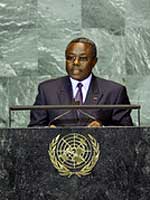Gabon
H.E. Mr. Hadj Omar Bongo Ondimba, President
23 September 2008
- Video: English | French [RealPlayer - 13 min]
- Statement: French [PDF]
- Back to the list of speakers
Statement Summary

© UN Photo
Click for caption and to enlarge
HADJ OMAR BONGO ONDIMBA, President of Gabon, said the high cost of basic foods, and the riots that emerged earlier this year following the dramatic price spikes and subsequent shortages, indicated the severity of the crisis, which has had a major impact on Africa. This situation was intolerable, and he noted that the application of preferential trade policies and export restrictions had helped contribute to the problem.
The international community needed to take collective action to ensure food security for the most vulnerable people. Welcoming the declaration adopted at the high-level conference on global food security on 5 June in Rome, he drew attention to the Maputo Declaration of July 2003, which laid out a framework for food security and development, as an example of Africa’s cooperation on food security.
To meet the challenges of soaring food prices, Gabon and other countries had taken urgent tax and budget measures, such as suspending import duties and other tariffs, which had, however, led to revenue losses. He stressed the need to work with international partners on the development of a food security strategy, which would include aspects such as water management, vegetable production, and ways to alleviate malnutrition and hunger. Those steps were necessary to achieve the Millennium Development Goals, he added.
The challenge of feeding a growing population was intimately linked to climate change, as well as the deterioration of the environment, declining water resources and deforestation. All of this prevented necessary increases in agricultural production. The international community needed to reduce greenhouse gas emissions and, in that regard, he welcomed the road map adopted in Bali at the thirteenth United Nations Conference on Climate Change. He also applauded the recent G-8 Summit in Japan, where Heads of State had committed to reducing greenhouse gas emissions by half by 2050.
Developing countries needed the broad support of the international community to meet new challenges, he continued. All development partners needed to honour their existing promises to double ODA and cancel debt that undermined sustainable development efforts. He also noted the negative impact that AIDS, malaria and other infectious diseases had on the African economies. The interdependence of threats facing the international community spotlighted the need for new impetus to promoting international solidarity, peace and international security.
Turning to Africa, he pointed to conflict situations, such as the ongoing conflict in Somalia, and the general security situation in Darfur. The Dakar Accord of 13 March, signed between Chad and the Sudan, had sparked genuine hope for stability in that region, he added, also welcoming the progress made in Côte d’Ivoire.
The world’s many challenges could not be resolved without collective action at the global level, he said, urging the strengthening of the United Nations system so it could better meet its own objectives. He pointed to the Peacebuilding Commission and the Human Rights Council, both results of the recommendations of the Assembly’s 2005 World Summit, as examples of positive efforts to strengthen the world body. He also welcomed efforts to revitalize the General Assembly, and commended the work to reform the Security Council. The building of a just and more secure world depended on these efforts, he added.
[Source: GA/10749]